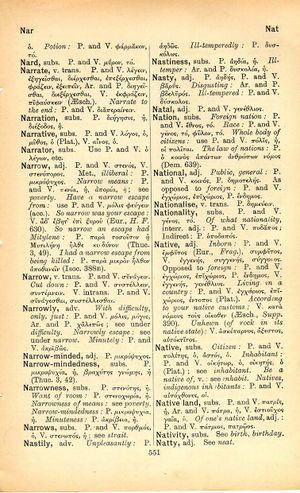nation: Difference between revisions
From LSJ
Οὐδὲν γυναικὸς χεῖρον οὐδὲ τῆς καλῆς → Nil muliere peius est, pulchra quoque → Das Schlimmste ist, selbst wenn sie schön ist, eine Frau
(CSV4) |
m (Woodhouse1 replacement) |
||
| Line 1: | Line 1: | ||
{{Woodhouse1 | {{Woodhouse1 | ||
|Text=[[File:woodhouse_551.jpg|thumb|link={{filepath:woodhouse_551.jpg}}]] | |Text=[[File:woodhouse_551.jpg|thumb|link={{filepath:woodhouse_551.jpg}}]] | ||
===substantive=== | |||
[[foreign nation]]: [[prose|P.]] and [[verse|V.]] [[ἔθνος]], τό. | |||
[[race]]: [[prose|P.]] and [[verse|V.]] [[γένος]], τό, [[φῦλον]], τό. | |||
[[whole body of citizens]]: use [[prose|P.]] and [[verse|V.]] [[πόλις]], ἡ, [[οἱ πολῖται]]. | |||
[[the law of nations]]: [[prose|P.]] [[ὁ κοινὸς ἁπάντων ἀνθρώπων νόμος]] ([[Demosthenes|Dem.]] 639). | |||
}} | }} | ||
Revision as of 08:55, 20 May 2020
English > Greek (Woodhouse)
substantive
foreign nation: P. and V. ἔθνος, τό.
race: P. and V. γένος, τό, φῦλον, τό.
whole body of citizens: use P. and V. πόλις, ἡ, οἱ πολῖται.
the law of nations: P. ὁ κοινὸς ἁπάντων ἀνθρώπων νόμος (Dem. 639).

